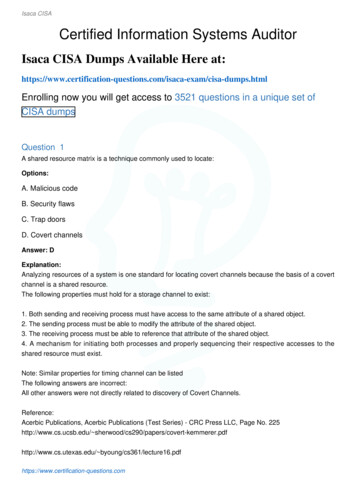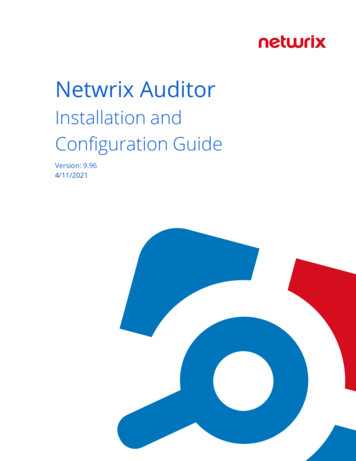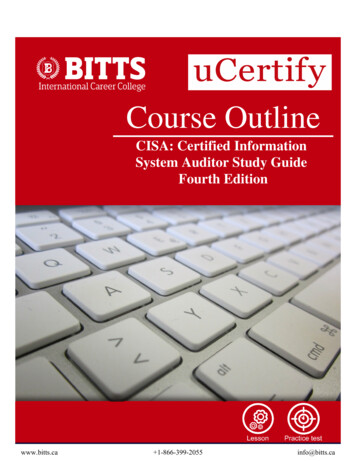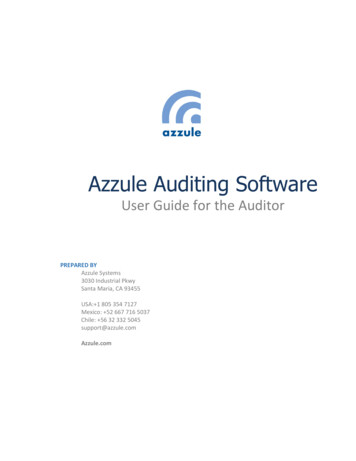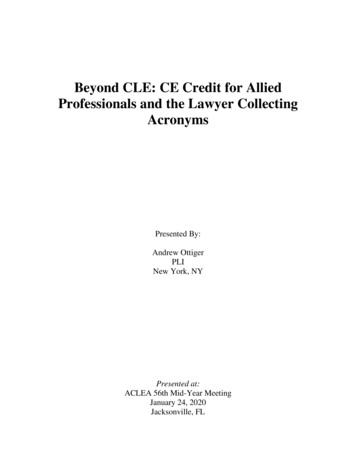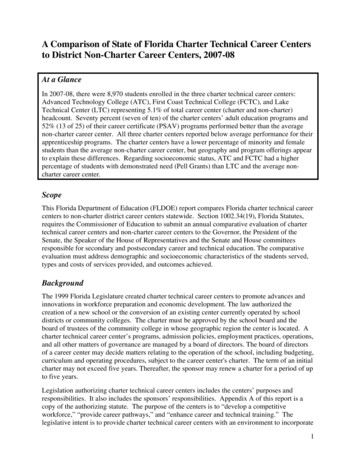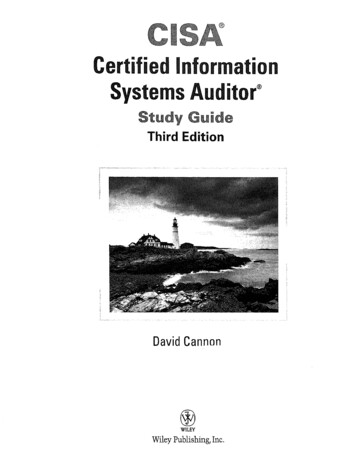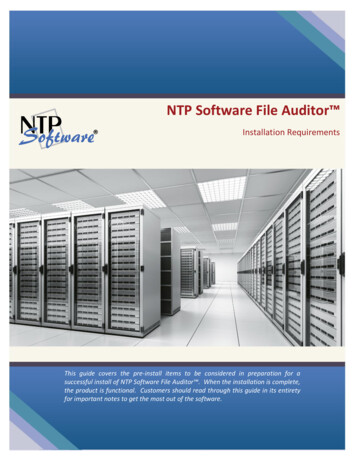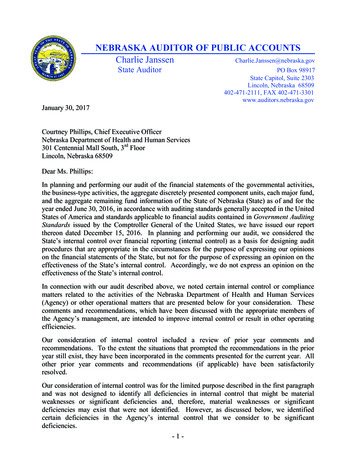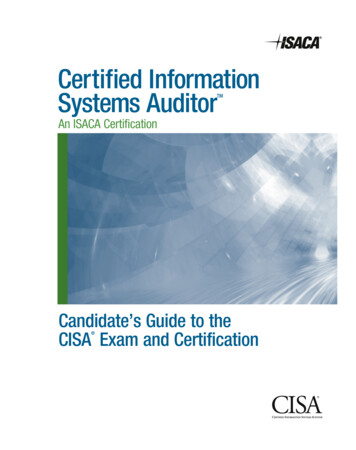
Transcription
Certified InformationSystems AuditorTMAn ISACA CertificationCandidate’s Guide to theCISA Exam and Certification
Candidate’s Guide to the CISA Exam and CertificationCISA Exams 2010—Important Date InformationExam Date—12 June 2010Early registration deadline:10 February 2010Final registration deadline:7 April 2010Exam registration changes:Between 17 April and 23 April,charged a US 50 fee, with nochanges accepted after 23 April 2010Refunds:By 16 April 2010, charged a US 100processing fee, with no refunds afterthat dateDeferrals:Requests received on or before23 April 2010, charged a US 50processing fee. Requests receivedfrom 24 April through 27 May 2010,charged a US 100 processing fee.After 27 May 2010, no deferrals willbe permitted.Exam Date—11 December 2010Early registration deadline:18 August 2010Final registration deadline:6 October 2010Exam registration changes:Between 9 October and15 October, charged a US 50 fee,with no changes accepted after15 October 2010Refunds:By 8 October 2010, charged aUS 100 processing fee, with norefunds after that dateDeferrals:Requests received on or before15 October 2010, charged a US 50processing fee. Requests receivedfrom 16 October through 24 November2010, charged a US 100 processingfee. After 24 November 2010,no deferrals will be permitted.All deadlines are based upon Chicago, Illinois, USA 5 p.m. CT (central time)2Table of ContentsOverview .3CISA Program Accreditation RenewedUnder ISO/IEC 17024:2003 .3The CISA Exam.3Preparing for the CISA Exam .4Administration of the CISA Exam .4Scoring the CISA Exam.6Types of Questions on the CISA Exam .6Application for CISA Certification .6Requirements for Initial CISA Certification .6Requirements for Maintaining CISA Certification .7ISACA Code of Professional Ethics .7Revocation of CISA Certification .7CISA Task and Knowledgement Statements .8ISACA With more than 86,000 constituents in more than 160 countries, ISACA(www.isaca.org) is a recognized worldwide leader in IT governance,control, security and assurance. Founded in 1969, ISACA sponsorsinternational conferences, publishes the ISACA Journal , and developsinternational information systems auditing and control standards.It also administers the globally respected Certified InformationSystems Auditor (CISA ) designation, earned by more than 60,000professionals since 1978; the Certified Information Security Manager (CISM ) designation, earned by more than 10,000 professionalssince 2002; and the new Certified in the Governance of Enterprise IT (CGEIT ) designation.DisclaimerISACA and the CISA Certification Board have designed the Candidate’sGuide to the CISA Exam and Certification as a guide to those pursuingthe CISA certification. No representations or warranties are made byISACA that use of this guide or any other association publication willassure candidates of passing the CISA exam.Reservation of RightsCopyright 2009 ISACA. Reproduction or storage in any form for anypurpose is not permitted without ISACA’s prior written permission. Noother right or permission is granted with respect to this work. All rightsreserved.ISACA3701 Algonquin Road, Suite 1010Rolling Meadows, IL 60008 USAPhone: 1.847.253.1545Fax: 1.847.253.1443E-mail: exam@isaca.orgWeb site: www.isaca.orgISBN 978-1-60420-120-8Candidate’s Guide to the CISA Exam and CertificationPrinted in the United States of America.
Candidate’s Guide to the CISA Exam and CertificationOverviewThe mark of excellence for a professional certification program is the value and recognition it bestows on the individual who achieves it. Since 1978,the Certified Information Systems Auditor (CISA) program, sponsored by ISACA, has been the globally accepted standard of achievement amonginformation systems (IS) audit, control and security professionals.The technical skills and practices that CISA promotes and evaluates are the building blocks of success in the field. Possessing the CISA designationdemonstrates proficiency and is the basis for measurement in the profession. With a growing demand for professionals possessing IS audit, controland security skills, CISA has become a preferred certification program by individuals and organizations around the world. CISA certification signifiescommitment to serving an organization and the chosen profession with distinction.CISA Program Accreditation Renewed Under ISO/IEC 17024:2003The American National Standards Institute (ANSI) has accredited the CISA certification under ISO/IEC 17024:2003, General Requirements for BodiesOperating Certification Systems of Persons. ANSI, a private, nonprofit organization, accredits other organizations to serve as third-party product,system and personnel certifiers.ISO/IEC 17024 specifies the requirements to be followed by organizations certifying individuals against specificrequirements. ANSI describes ISO/IEC 17024 as “expected to play a prominent role in facilitating global standardization ofthe certification community, increasing mobility among countries, enhancing public safety and protecting consumers.”ANSI’s accreditation: Promotes the unique qualifications and expertise that ISACA certifications provide Protects the integrity of the certifications and provides legal defensibility Enhances consumer and public confidence in the certifications and the people who hold them Facilitates mobility across borders or industriesANSI Accredited ProgramPERSONNEL CERTIFICATION#0694ISO/IEC 17024Accreditation by ANSI signifies that ISACA’s procedures meet ANSI’s essential requirements for openness, balance, consensus and due process. Withthis accreditation, ISACA anticipates that significant opportunities for CISAs will continue to present themselves around the world.The CISA ExamDevelopment/Description of the CISA ExamThe CISA Certification Committee oversees the development of the exam and ensures the currency of its content. Questions for the CISA exam aredeveloped through a comprehensive process designed to enhance the ultimate quality of the exam. The process includes a Test EnhancementSubcommittee (TES) that works with item writers to develop and review questions before they are submitted to the CISA Certification Committee for review.A job practice serves as the basis for the exam and the experience requirements to earn the CISA certification. This job practice is periodically updatedand consists of six content areas (domains). The domains and the accompanying tasks and knowledge statements were the result of extensiveresearch and feedback from subject matter experts around the world.The tasks and knowledge statements depict the tasks performed by CISAs and the knowledge required to perform these tasks. Exam candidates willbe tested based on their practical knowledge associated with performing these tasks.The current job practice analysis contains the following domains and percentages: The IS Audit Process (10%) IT Governance (15%) Systems and Infrastructure Life Cycle Management (16%) IT Service Delivery and Support (14%) Protection of Information Assets (31%) Business Continuity and Disaster Recovery (14%)Note: The percentages listed with the domains indicate the emphasis or percentage of questions that will appear on the exam from each domain.For a description of each domain’s task and knowledge statements, please refer to pages 8-11.The exam consists of 200 multiple-choice questions and is administered biannually in June and December during a four-hour session. Candidatesmay choose to take the exam in one of several languages. For a current list of languages, please visit www.isaca.org/cisaterminology.Although knowledge of Control Objectives for Information and related Technology (COBIT ) is not specifically tested on the CISA exam, the COBIT control objectives or processes are reflected in the CISA job practice task statements. As such, a thorough review of COBIT is recommended for candidatepreparation for the CISA exam. To focus a candidate’s attention on the specific COBIT processes that relate to CISA practice analysis tasks, go towww.isaca.org/cisaguide.3
Candidate’s Guide to the CISA Exam and CertificationPreparing for the CISA ExamPassing the CISA exam can be achieved through an organized plan of study. To assist individuals with the development of a successful studyplan, ISACA offers study aids and review courses to exam candidates. See www.isaca.org/cisaguide to view the ISACA study aids that can helpyou prepare for the exam. Order early as delivery time can be from one to four weeks depending on geographic location and customs clearancepractices. For current shipping information see www.isaca.org/shipping.NEWISACA also offers a CISA Online Review Course. The course includes interactive exercises, case studies, review tools and practicequestions. Visit www.isaca.org/elearning for more information as well as a course preview.A list of references recommended for further study in preparation for the exam can be found at www.isaca.org/cisaguide. A more comprehensive listcan be found in the CISA Review Manual 2009.A list of acronyms that candidates should be familiar with and an additional list of acronyms that candidates may wish to view can be found atwww.isaca.org/cisaguide.To assist candidates with technical terminology, a list of the most frequently used technical terms in English mapped with their translation to otherlanguages offered is available on ISACA’s web site at www.isaca.org/examterm.ISACA maintains a glossary of terms as well as glossaries specific to each certification. These glossaries are available at www.isaca.org/glossary.No representation or warranties assuring candidates’ passage of the exam are made by ISACA or the CISA Certification Committee in regard to theseor other association publications or courses.Administration of the CISA ExamISACA utilizes an internationally recognized professional testing agency to assist the construction, administration and scoring of the CISA exam.Candidates wishing to comment on the test administration conditions may do so at the conclusion of the testing session by completing the “Test Administration Questionnaire.” The Test Administration Questionnaire is presented at the back of the examination booklet and your questionnaire answersshould be entered in boxes P through S of the Special Codes section (Grid No. 4) on the front of your Answer Sheet.Candidates who wish to address any additional comments or concerns about the examination administration should contact ISACA internationalhead-quarters by letter or by e-mail (exam@isaca.org). These comments or concerns should be received by ISACA within 2 weeks after the examination date.Candidates who wish to comment on the contents of the examination may do so by mailing their comments to the Professional Examination Service.However, only those comments received by The Professional Examination Service during the first 2 weeks after the exam administration will be considered in the final scoring process of the examination. You may obtain the address of the Professional Examination Service from the Proctor after youcomplete the examination.Admission TicketApproximately two to three weeks prior to the CISA exam date, candidates will receive a physical admission ticket and an e-ticket from ISACA.Tickets will indicate the date, registration time and location of the exam, as well as a schedule of events for that day and a list of materials thatcandidates must bring with them to take the CISA exam.Please Note: In order to receive a hard copy admission ticket, all fees must be paid. In order to receive an e-ticket, all fees must be paid andcandidates must have a current e-mail address on file. Only candidates with an admission ticket will be admitted to the exam. Both the hard copyadmission ticket and e-ticket are valid for the exam. If a candidate’s mailing and/or e-mail address changes, he/she should update his/her profile onthe ISACA web site (www.isaca.org) or contact exam@isaca.org.It is imperative that candidates note the specific registration and exam times on their admission ticket. NO CANDIDATE WILL BE ADMITTEDTO THE TEST CENTER ONCE THE CHIEF EXAMINER BEGINS READING THE ORAL INSTRUCTIONS, APPROXIMATELY 30 MINUTES BEFORETHE EXAM BEGINS. Any candidate who arrives after the oral instructions have begun will not be allowed to sit for the exam and will forfeit his/herregistration fee. An admission ticket can only be used at the designated test center specified on the admission ticket.Special ArrangementsUpon request, ISACA will make reasonable accommodations in its exam procedures for candidates with documented disabilities or religiousrequirements. These candidates may request consideration for reasonable alterations in exam format, presentations, food or drink at the exam site, orscheduling. Requests for food or drink at the exam site must be accompanied by a doctor’s note; otherwise, no food or drinks are allowed at anyexam site. Request for consideration must be submitted to ISACA International Headquarters in writing, accompanied by appropriate documentation, nolater than 7 April 2010 for the June 2010 exam and 6 October 2010 for the December 2010 exam.4
Candidate’s Guide to the CISA Exam and CertificationBe PromptRegistration will begin at the time indicated on the admission ticket at each center. All candidates must be registered and in the test center whenthe chief examiner begins reading the oral instructions. NO CANDIDATE WILL BE ADMITTED TO THE TEST CENTER ONCE THE CHIEF EXAMINERBEGINS READING THE ORAL INSTRUCTIONS, APPROXIMATELY 30 MINUTES BEFORE THE EXAM BEGINS.Remember to Bring the Admission TicketCandidates can use their admission ticket (either their e-ticket or physical admission ticket) only at the designated test center. Candidates will beadmitted to the test center only if they have a valid admission ticket and an acceptable form of identification (ID). An acceptable form of ID must be acurrent and original government-issued ID that contains the candidate’s name, as it appears on the admission ticket, and the candidate’s photograph.The information on the ID cannot be handwritten. All of these characteristics must be demonstrated by the single piece of ID provided. Examplesinclude, but are not limited to, a passport, driver’s license, military ID, state ID, green card and national ID. Any candidate who does not provide anacceptable form of ID will not be allowed to sit for the exam and will forfeit his/her registration fee.Observe the Test Center’s Rules Candidates will not be admitted to a test center after the oral instructions have begun. Candidates should bring several sharpened No. 2 or HB (soft lead) pencils and a good eraser. Pencils and erasers will not be available at the test center. Candidates are not allowed to bring reference materials, blank paper or language dictionaries into the test center. Candidates are not allowed to bring or use a calculator in the test center. Candidates are not allowed to bring any type of communication devices (i.e., cell phones, PDAs, Blackberries) into the test center. Visitors are not permitted in the test center. No food or beverages are allowed in the test center.The complete Personal Belongings Policy is available at www.isaca.org/cisabelongings.Be Careful in Completing the Answer Sheet Before a candidate begins the exam, the test center chief examiner will read aloud the instructions for entering identification information on theanswer sheet. A candidate’s identification number as it appears on the admission ticket and all other requested information must be correctlyentered or scores may be delayed or incorrectly reported. A proctor speaking the primary language used at each test center is available. If a candidate desires to take the exam in a language other than theprimary language of the test center, the proctor may not be conversant in the language chosen. However, written instructions will be available inthe language of the exam. A candidate is instructed to read all instructions carefully and understand them before attempting to answer the questions. Candidates who skipover the directions or read them too quickly could miss important information and possibly lose credit. All answers are to be marked in the appropriate circle on the answer sheet. Candidates must be careful not to mark more than one answer perquestion and to be sure to answer a question in the appropriate row of answers. If an answer needs to be changed, a candidate is urged to erasethe wrong answer fully before marking in the new one. All questions should be answered. There are no penalties for incorrect answers. Grades are based solely on the number of questionsanswered correctly, so do not leave any questions blank. After completion, candidates are required to hand in their answer sheet and test booklet.Budget One’s Time The exam, which is four hours in length, allows for a little over one minute per question. Candidates are advised to pace themselves to completethe entire exam. Candidates must complete an average of 50 questions per hour. Candidates are urged to immediately record their answers on the answer sheet. No additional time will be allowed after the exam time haselapsed to transfer or record answers should a candidate mark answers in the test booklet.Conduct Oneself Properly To protect the security of the exam and maintain the validity of the scores, candidates are asked to sign the answer sheet. The CISA Certification Committee reserves the right to disqualify any candidate who is discovered engaging in any kind of misconduct, such asgiving or receiving help; using notes, papers or other aids; attempting to take the exam for someone else; or removing test materials or notes fromthe test center. The testing agency will provide the CISA Certification Committee with records regarding such irregularities for their review and torender a decision.Reasons for DismissalThe proctor may dismiss a candidate for any of the following reasons: Unauthorized admission to the test center. Candidate creates a disturbance or gives or receives help. Candidate attempts to remove test materials or notes from the test center. Candidate brings items into the test center that are not permitted.5
Candidate’s Guide to the CISA Exam and CertificationScoring the CISA ExamThe CISA exam consists of 200 multiple-choice items. Candidate scores are reported as a scaled score. A scaled score is a conversion of acandidate’s raw score on an exam to a common scale. ISACA uses and reports scores on a common scale from 200 to 800. For example, the scaledscore of 800 represents a perfect score with all questions answered correctly; a scaled score of 200 is the lowest score possible and signifies thatonly a small number of questions were answered correctly. A candidate must receive a score of 450 or higher to pass the exam. A score of 450represents a minimum consistent standard of knowledge as established by the CISA Certification Committee. A candidate receiving a passing scoremay then apply for certification if all other requirements are met.The CISA exam contains some questions which are included for research and analysis purposes only. These questions are not separately identifiedand not used to calculate your final score.Approximately eight weeks after the test date, the official exam results will be mailed to candidates. Additionally, with the candidate’sconsent on the registration form, an e-mail message containing the candidate’s pass/fail status and score will be sent to the candidate. This e-mailnotification will only be sent to the address listed in the candidate’s profile at the time of the initial release of the results. To ensure the confidentialityof scores, exam results will not be reported by telephone or fax. To prevent e-mail notification from being sent to spam folders, candidates shouldadd exam@isaca.org to their address book, whitelist or safe-senders list.Candidates will receive a score report containing a subscore for each domain area. Successful candidates will receive, along with a score report,details on how to apply for CISA certification. Unsuccessful candidates will receive, along with a score report, a copy of the new CISA Bulletin ofInformation.The subscores can be useful in identifying those areas in which the unsuccessful candidate may need further study before retaking the exam.Unsuccessful candidates should note that the total scaled score cannot be determined by calculating either a simple or weighted average of thesubscores.Candidates receiving a failing score on the exam may request a hand score of their answer sheets. This procedure ensures that no stray marks,multiple responses or other conditions interfered with computer scoring. Candidates should understand, however, that all scores are subjected toseveral quality control checks before they are reported; therefore, rescores most likely will not result in a score change. Requests for hand scoringmust be made in writing to the certification department within 90 days following the release of the exam results. Requests for a hand score after thedeadline date will not be processed. All requests must include a candidate’s name, exam identification number and mailing address. A fee of US 65must accompany each request.Types of Questions on the CISA ExamCISA exam questions are developed with the intent of measuring and testing practical knowledge and the application of general concepts andstandards. All questions are designed with one best answer.Every CISA question has a stem (question) and four options (answer choices). The candidate is asked to choose the correct or best answer from theoptions. The stem may be in the form of a question or incomplete statement. In some instances, a scenario may also be included. These questionsnormally include a description of a situation and require the candidate to answer two or more questions based on the information provided. Thecandidate is cautioned to read each question carefully. A CISA exam question may require the candidate to choose the appropriate answer based ona qualifier, such as MOST likely or BEST. In every case, the candidate is required to read the question carefully, eliminate known incorrect answersand then make the best choice possible. Representations of CISA exam questions are available at www.isaca.org/cisaassessment.Application for CISA CertificationPassing the exam does not mean a candidate is a CISA. Once a candidate passes the CISA exam, he/she has five years from the date of the examto apply for certification. Successful candidates must complete the application for certification and have their work experience verified usingthe appropriate forms included in the application. Candidates are not certified, and cannot use the CISA designation, until the completedapplication is received and approved. Once certified, the new CISA will receive a certificate and the CISA continuing professional education (CPE)policy requirements. At the time of application, individuals must also acknowledge that ISACA reserves the right, but is not obligated, to publish orotherwise disclose their CISA status.Requirements for Initial CISA CertificationCertification is granted initially to individuals who have completed the CISA exam successfully and meet the following work experience requirements.A minimum of five years of professional IS audit, control, assurance or security work experience is required for certification. Substitutions andwaivers of such experience may be obtained as follows: A maximum of one year of information systems OR one year of non-IS auditing experience can be substituted for one year of experience. Sixty to 120 completed university semester credit hours (the equivalent of a two-year or four-year degree), not limited by the 10-year precedingrestriction, can be substituted for one or two years, respectively, of experience. Even if multiple degrees have been earned, a maximum of twoyears can be claimed.6
Candidate’s Guide to the CISA Exam and Certification A bachelor’s or master’s degree from a university that enforces the ISACA-sponsored Model Curriculum can be substituted for one year ofexperience. To view a list of these schools, please visit www.isaca.org/modeluniversities. This option cannot be used if three years of experiencesubstitution and educational waiver have already been claimed. A master’s degree in information security or information technology from an accredited university can be substituted for one year of experience.Exception: Two years as a full-time university instructor in a related field (e.g., computer science, accounting, information systems auditing) can besubstituted for every one year of experience.Experience must have been gained within the 10-year period preceding the date of the application for CISA certification or within five years from thedate of initially passing the exam. If the application for CISA certification is not submitted within five years from the passing date of the exam, retakingand passing the exam is required.It is important to note that many individuals choose to take the CISA exam prior to meeting the experience requirements. This practice is acceptableand encouraged, although the CISA designation will not be awarded until all requirements are met.Requirements for Maintaining CISA CertificationCISAs must comply with the following requirements to retain certification: Attain and report an annual minimum of 20 CPE hours. The CISA CPE policy (www.isaca.org/cisacpepolicy) requires the attainment of CPE hours overan annual and three-year reporting period. Attain and report a minimum of 120 CPE hours for a three-year reporting period. Submit annual CPE maintenance fees in full to ISACA International Headquarters. Respond and submit required documentation of CPE activities to support the hours reported if selected for an annual audit. Comply with the ISACA Code of Professional Ethics.Failure to comply with these general requirements will result in the revocation of an individual’s CISA designation.ISACA Code of Professional EthicsISACA sets forth this Code of Professional Ethics to guide the professional and personal conduct of members of the association and/or itscertification holders.Members and ISACA certification holders shall:1. Support the implementation of, and encourage compliance with, appropriate standards, procedures and controls for information systems2. Perform their duties with objectivity, due diligence and professional care, in accordance with professional standards and best practices3. Serve in the interest of stakeholders in a lawful and honest manner, while maintaining high standards of conduct and character, and not engage inacts discreditable to the profession4. Maintain the privacy and confidentiality of information obtained in the course of their duties unless disclosure is required by legal authority.Such information shall not be used for personal benefit or released to inappropriate parties.5. Maintain competency in their respective fields and agree to undertake only those activities that they can reasonably expect to complete withprofessional competence6. Inform appropriate parties of the results of work performed, revealing all significant facts known to them7. Support the professional education of stakeholders in enhancing their understanding of information systems security and controlFailure to comply with this Code of Professional Ethics can result in an investigation into a member’s and/or certification holder’s conductand,ultimately, in disciplinary measures.Revocation of CISA CertificationThe CISA Certification Committee may, at its discretion after due and thorough consideration, revoke an individual’s CISA certification for anyof the following reasons: Failing to comply with the CISA CPE policy Violating any provision of the ISACA Code of Professional Ethics Falsifying or deliberately failing to provide relevant information Intentionally misstating a material fact Engaging or assisting others in dishonest, unauthorized or inappropriate behavior at any time in connection with the CISA exam or thecertification process7
Candidate’s Guide to the CISA Exam and CertificationDescription of CISA Job Practice AreasCISA Task and Knowledge StatementsCONTENT AREA (Domain)1. The IS Audit Process—Provide IS audit services in accordance with IS audit standards, guidelines and best practices to assist theorganization in ensuring that its information technology and business systems are protected and controlled.Task Statements1.1 Develop and implement a risk-based IS audit strategy for the organization in compliance with IS audit standards, guidelines and best practices.1.2 Plan specific audits to ensure that IT and business systems are protected and controlled.1.3 Conduct audits in accordance with IS audit standards, guidelines and best practices to meet planned audit objectives.1.4 Communicate emerging issues, potential risks and audit results to key stakeholders.1.5 Advise on the implementation of risk management and control practices within the organization, while maintaining independence.Knowledge Statements1.1 Knowledge of ISACA IS Auditing Standards, Guidelines and Procedures and the Code of Professional Ethics1.2 Knowledge of IS auditing practices and techniques1.3 Knowledge of techniques to gathe
the Certified Information Systems Auditor (CISA) program, sponsored by ISACA, has been the globally accepted standard of achievement among information systems (IS) audit, control and security professionals. The technical skills and practices that CISA promotes and evaluates are the building blocks of success in the field.
